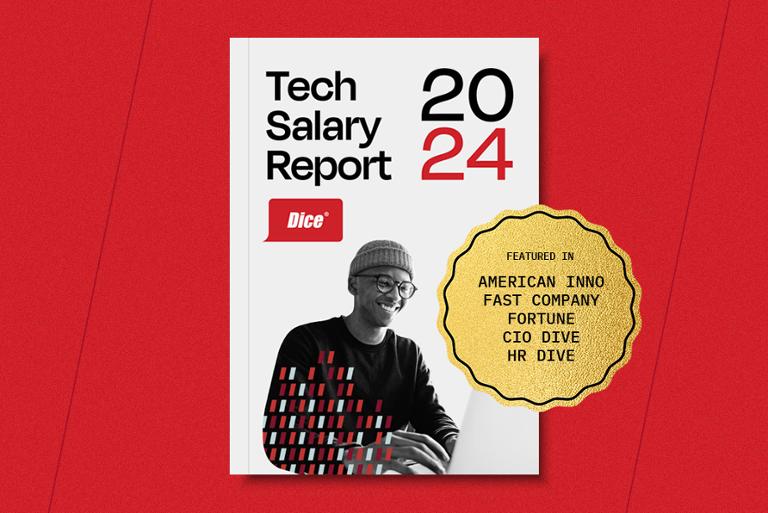
Web development is a constantly evolving field. It’s no longer just about building web pages; a good web developer must stay on top of everything from the blockchain to rapidly evolving cloud platforms. Given their importance to organizations’ web strategies, you might think web developers pull down pretty good compensation—and in many cases, you’d be right. Let’s dig into web developer salary!
Summary
- What Do Web Developers Actually Do?
- What is a web developer’s average salary?
- What do web developers make in comparison with other popular tech positions?
- Find out which industries and tech hubs are paying top dollar for tech talent in Dice’s latest Tech Salary Report.
- What are the most valuable skills for a web developer?
- What skills do you need as a web developer?
- What’s the interview process like for web developer jobs?
What Do Web Developers Actually Do?
With the growth and maturation of the web, web developers can potentially be tasked with a broad range of responsibilities. Depending on their specialization, they might have to build and maintain websites, web pages, web applications, and other web-based services; these platforms, in turn, demand a range of skills and frameworks, from HTML/CSS, JavaScript, and iOS/Android to more cutting-edge tech such as machine learning.
Things get even more granular from there. For example, some web developers are front-end developers, meaning they’re responsible for the look and feel of the web property; others are back-end developers who focus on the infrastructure that allows the user-facing parts of a website or service to actually run. Full-stack developers, meanwhile, work on both the front- and back-ends, a terrifically complex job that can nonetheless open up a lot of opportunities. We’ll dig more in all of these roles a little further down.
What is a web developer’s average salary?
According to Lightcast (formerly Emsi Burning Glass), which collects and analyzes millions of job postings from across the country, the median salary for web developers currently stands at $91,991. Moreover, the profession is projected to grow 8.4 percent over the next 10 years, and current time needed to fill an open position stands at 40 days—both indications of strong demand for the role.
What do web developers make in comparison with other popular tech positions?
The average tech salary in the United States now stands at $104,566, a 6.9 percent increase between 2020 and 2021, according to the latest Dice Tech Salary Report. Compared to the median web developer salary estimated by Emsi Burning Glass, it might seem like this role makes notably less than the average for all tech roles. However, it always pays (literally) to keep in mind that salaries rise with experience, skills, and specialization—a web developer who knows in-demand skills such as SQL, and who’s been working in the industry for a number of years, can expect to land six-figure compensation.

Find out which industries and tech hubs are paying top dollar for tech talent in Dice’s latest Tech Salary Report.
What are the most valuable skills for a web developer?
Based on a Lightcast evaluation of job postings, top specialized skills for web developers include:
- JavaScript
- Web development
- Front-end development
- Software engineering
- SQL
- Java
- Git
- HTML
- CSS
A web developer will typically need to know how to use these skills (and others) to accomplish some key tasks, including:
- Debug a website and/or coding errors.
- Optimize the website’s speed and performance.
- Ensure that the website works properly across a range of browsers.
- Optimize the website’s responsiveness on a wide range of hardware, from phones and tablets to PCs.
There’s also a significant need for “soft skills” such as empathy and communication, because web developers often have to communicate plans and results to various stakeholders, whether they’re freelancers or full-time staffers. Excellent communication skills can result in a boosted web developer salary.
As we mentioned previously, keep in mind that many web developers choose to specialize in either front-end (i.e., what users see) or back-end (i.e., the infrastructure that allows websites and web apps to run) development, although more and more are gravitating toward full-stack development. If you’re interested in becoming a front-end developer (remember, the folks tasked with maintaining the user-facing aspects of a web property), you’ll need at least some of these critical skills:
- JavaScript
- Front-End Development
- Software Engineering
- React JavaScript
- TypeScript
- Software Development
- Web Application Development
Those who want to manage web infrastructure as a back-end developer, meanwhile, will likely need to master at least some of the following skills:
- Continuous integration
- Amazon Web Services (AWS)
- ElasticSearch
- GitHub
- Machine Learning
- React JavaScript
- MongoDB
- Test Driven Development (TDD)
- Big Data
- Backend Development
No matter what kind of web development pathway you choose, though, keep in mind that mastering highly specialized skills (such as anything dealing with data analytics) could open up new opportunities and the prospect of higher pay.
What skills do you need as a web developer?
According to experts and longtime web developers, “soft skills” never go out of style, even as various technical skills grow and wane in usage. Christian Huynen, CEO and founder of DesignBro!, tells Dice: “Collaboration is inevitable in web development. Teamwork is essential for the overall success of any project. That's why we hire candidates who work well with colleagues. Results with coding by oneself must be at par with a new hire's results with pair programming. As a CEO who recruits web developers myself, being a team player is a huge point for me.”
You’ll spend a lot of time coding alone at your desk, but that work is typically a collaborative effort in some way. You may be tasked with doing part of a larger project on your own, but in order to land jobs and secure a high web developer salary, it’s critical you show potential employers how your thread was woven into the larger project and that you clearly understood how your work affected others.
Also, don’t be afraid to freelance: You can show your aptitude for collaboration in the form of freelancing, especially on open-source projects. This can be especially handy if you’re trying to take the next step in your career and manage projects. Showing you can successfully manage open-source projects is an amazing way to prove your worth.
Freelancing for your own gain is a great way to show you’re able to work with clients and manage projects. Aseem Kishore, owner and CEO of AK Internet Consulting, says, “Any developer who knows his worth isfreelancing. To be honest, it's a win-win for everyone to hire freelancers.”
Will Cannon, founder and CEO of UpLead, adds: “Developers struggle to understand their client’s idea. This further delays the project as a whole.”
Successful freelancers understand the scope of a project as well as client or customer needs; it’s especially handy for those looking to move up in their careers but don’t have as much opportunity in their current role, and/or want to increase their web developer salary. (Just make sure your current employer is okay with you freelancing before starting any project.)
Whatever skills you learn, make sure to note them on your web developer resume when it comes time to apply for jobs. Before sitting down to tweak your resume for a specific job, re-read the job posting and take note of any skills it mentions that you’ve mastered; you’ll want to list those on your resume, because that will help your application move past the automated resume screeners (which look for keywords such as skills) and move onto the next stage.
What’s the interview process like for web developer jobs?
Cannon notes: “Hiring managers usually look for experience and skills to select a candidate. As a web developer, various capstones, and successful client projects are the factors that will attract the recruiters.” During the interview process, make sure you’re ready with some key stories about how you overcame professional challenges and helped projects succeed. Make sure these stories emphasize your problem-solving abilities, as well as your teamwork.
Bruce Mason, Delivery Director for Ukraine-based QArea, says you might be tested on specific web-developer tasks during the interview process, including real-time or post-back validation, handling status messages, and animations within different browsers. A firm grasp on those types of skills can help you stand out and ace the stressful technical interviews you’re bound to face.
Mason also suggests an understanding of SEO best practices, testing, debugging, responsive design, and web development best practices will help you stand apart. A portfolio of your work can help by demonstrating the end results of your efforts; feel free to add URLs to your résumé, too.
Many web developer interview questions will dig deeply into your technical skills, so make sure you’ve reviewed your skill-set and worked through some example problems beforehand (websites such as Leetcode can help with this). If (and when) you ace the interview, knowing a broader range of skills will potentially allow you to negotiate for a higher salary.


